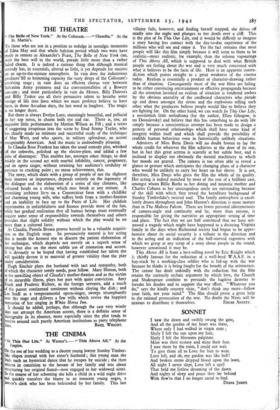THE CINEMA
"la This Our Life." At Warner's.—" This Above All." At the Empire.
ON the eve of her wedding to a decent young lawyer Stanley Timber- lake elopes instead with her sister's husband ; this young man she leads such an hysterical dance that he escapes by suicide ; she then returns in contrition to the bosom of her family and sets about recapturing her original fiancé—now engaged to her widowed sister. In the course of her scheming she kills a child in a wild night drive
d quickly transfers the blame to an innocent young negro, a Lawyer's derk who has been befriended by her family. This last
villainy fails, 'however, and finding herself trapped, she drives off madly into the night and plunges to her death over a cliff. This is the plot of In This Our Life, and it would. be difficult to imagine a story having less contact with the day-to-day experience of the millions who will see and enjoy it. Yet the fact remains that most people will like this film simply because it will seem to them to be realistic—more realistic, for example, than the solemn vapourings of This Above All, which is supposed to deal with what British people are feeling about the war and is very much concerned with what it believes to be the facts of life. Here is an apparent contra- diction which points straight to a great weakness of the cinema today. Realism is essentially a product of character-drawing rather than of situation. Consequently most of the war films are failing to be either convincing entertainment or effective propaganda because all the attention lavished on realism of situation is rendered useless by the obvious unreality of the cardboard characters who parade up and down amongst the sirens and the explosions telling each other what the producers believe people would like to believe they are fighting for. On the other hand, we can watch In This Our Life, a novelettish little melodrama (for the author, Ellen Glasgow, is no Dostoievsky) and believe that this has something to do with life simply because a conscientious attempt has been made to design a pattern of personal relationships which shall have some kind of integrity within itself and which shall provide the possibility of credible human behaviour even in fantastically unlikely situations.
Admirers of Miss Bette Davis will no doubt hasten to lay the whole credit for whatever the film achieves at the door of its star, but in fact this great actress is scarcely at her subtle best, and is inclined to display too obviously the mental machinery to which her moods are geared. The camera is too often able to reveal a glance or gesture which anticipates the changing plans of a character who would be unlikely to carry her heart on her sleeve. It is not, therefore, Miss Davis who gives the film the whole of its quality. Her acting is indeed matched by most of the rest of a brilliant cast, amongst whom Billie Burke as her doting and neurotic mother and Charles Coburn as her unscrupulous uncle are outstanding because of the skill with which they reveal the hereditary background of Stanley Timberlake's twisted soul. The family atmosphere is excel- lently drawn throughout and John Huston's direction is more mature than in The Maltese Falcon. There are fewer personal idiosyncrasies of camera-angle and continuity and he, more than anyone, is responsible for giving the narrative an appropriate setting of time and place. The fact that we are half convinced that we have wit- nessed a tragedy which might have happened to a decaying Virginia family in the days when Richmond society had begun to be appre- hensive about its social security is a tribute to the direction and to the acting and an indication of the half-starved eagerness with which we grasp at any scrap of a story about people in the round, however sensational it may be.
This Above All is from a best-selling novel by Eric Knight which is chiefly famous for the seduction of a well-bred W.A.A.F. in a hay-stack by a working-class soldier who is fed-up with the war because he thinks it is being fought for the benefit of the aristocracy. The censor has dealt unkindly with the seduction but the film retains the curiously archaic argument by which love, the Church and Shakespeare combine to persuade the fugitive deserter to forsake his doubts and to support the war effort. " Whatever you do," says the kindly country vicar, "don't think any more—follow your faith, not your mind." The film should prove a great help to the rational prosecution of the war. No doubt the Nazis will be
anxious to distribute it themselves. EDGAR ANSTE Y.


























 Previous page
Previous page